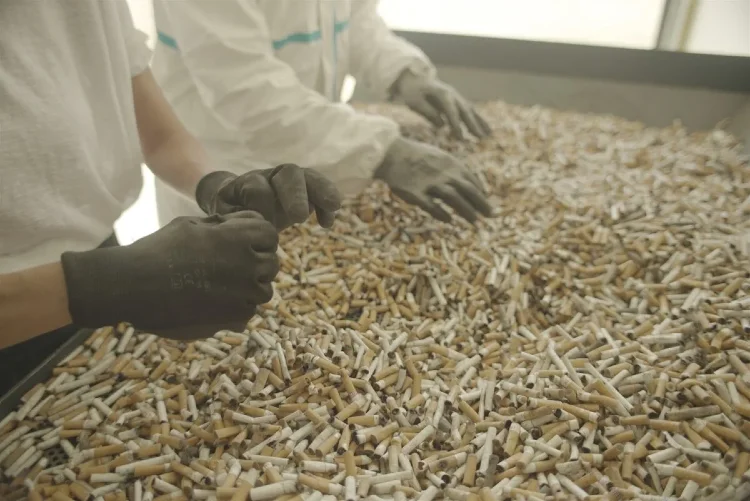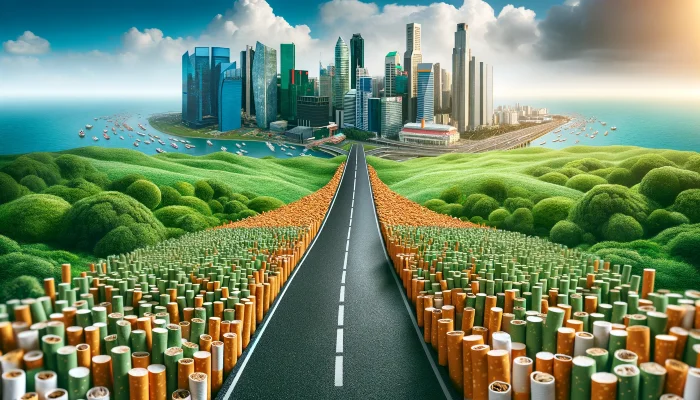In a world where the remnants of 18 billion cigarettes smoked daily are choking our planet, Slovakia is charting an innovative course. A mere third of these cigarette butts find their way into waste bins, leaving the rest to litter our environment. This alarming statistic is now being confronted head-on in the Slovakian capital, Bratislava.
Bratislava Leads the Charge in Cigarette Recycling
The city’s waste management authority, Odvoz a Likvidácia Odpadu (OLO), has launched an ambitious project to transform these discarded filters into something constructive – literally. During the festive hustle of the city’s Christmas markets, OLO trialed special receptacles designed to collect cigarette waste, including those from modern smoking devices like vapes. Their goal? To repurpose this refuse into a material that’s all too familiar to us – asphalt for roads.
In collaboration with the Bratislava City Council and partners SPAK-EKO and EcoButt, OLO’s initiative stands as a global first. Martina Čechová, OLO’s circular economy manager, highlights the dual benefit of this endeavor: “If visitors to a festival, run, market, or other urban event throw cigarette butts into a special container, they will contribute not only to a cleaner environment but to the material recovery of this type of waste.”

This collaborative effort aims to convert used cigarette filters into specialized fibers, which can then be mixed into asphalt for road construction. It’s a groundbreaking approach to waste management, signaling a shift towards sustainable and practical solutions.
While Bratislava’s 2024 goal is ambitious, it’s not the first instance of this innovative recycling in Slovakia. The central Slovakian town of Žiar nad Hronom boasts a unique claim to fame – the world’s first road made from recycled cigarette butts, courtesy of EcoButt.
EcoButt's Process: Transforming Butts into Asphalt
The process of turning cigarette butts into asphalt is a fascinating example of innovative recycling. Here’s how EcoButt, a pioneer in this field, achieves this feat:
- Collection: The journey begins with collection. Specialized bins are placed in strategic locations to encourage smokers to dispose of their butts responsibly. These bins are then collected by EcoButt.
- Cleaning and Processing: Upon collection, the cigarette butts undergo a thorough cleaning process to remove toxins and any residual tobacco. The cleaned filters, composed of cellulose acetate fibers, are then dried, and prepared for the next step.
- Transformation into Fibers: The cellulose acetate from the filters is transformed into fine fibers. This process involves breaking down the butts into their constituent elements, which can then be spun into fibers.
- Mixing with Asphalt: These fibers are mixed with traditional asphalt materials. The cigarette butt fibers act as a reinforcing agent, enhancing the asphalt’s durability and longevity. This mixture is heated and combined under specific conditions to ensure optimal integration of the materials.
- Laying the Roads: Finally, the cigarette butt-infused asphalt is ready to be used just like conventional asphalt. It can be laid down to construct new roads or repair existing ones, providing a sturdy and long-lasting surface.
Through this process, EcoButt not only addresses the environmental hazard posed by cigarette butts but also contributes to sustainable urban development. This innovative recycling method transforms a hazardous waste product into a valuable resource, paving the way for a cleaner, greener future.

How Big Of A Problem Are Discarded Cigarette Butts?
Imagine a mountain of approximately 4.5 trillion cigarette butts, each year, littering streets, infiltrating waterways, and polluting our environment. This isn’t a scene from a dystopian novel; it’s the current global crisis we face with discarded cigarette butts. They are the most common form of plastic waste in the world, making up an astonishing 30-40% of items collected in coastal and urban clean-ups.
These butts contain cellulose acetate, a form of plastic, which can take over a decade to decompose. As they linger, they leach toxic chemicals like arsenic, lead, and nicotine into the environment, posing a threat to wildlife and ecosystems.
One cigarette butt can contaminate about 7.5 liters of water, harming aquatic life. The magnitude of this problem isn’t just an environmental issue, but a significant health concern, affecting the very air we breathe and the water we drink.
More To Discover
- Sustainable or Not? The Controversy Over Gear Used in MSC-Certified Tuna Fishing
- Planting Trees in the Wrong Places Can Warm the Planet
- The Unfreezeable Octopus: A Deep Dive into Antarctica’s Chilliest Mystery (Choose Deep Dive or Kid-Friendly Edition)
- Water Batteries: The Safe, Affordable, and Eco-Friendly Energy of the Future That Won’t Explode
Conclusion: A Step Towards a Cleaner Future
Slovakia’s initiative to recycle cigarette butts into road asphalt represents a creative and proactive approach to waste management. By addressing a significant environmental issue, this project not only promises cleaner streets but also sets a precedent for practical waste repurposing. It’s a pioneering step that other nations might well follow, turning a global problem into a path towards sustainability.



















